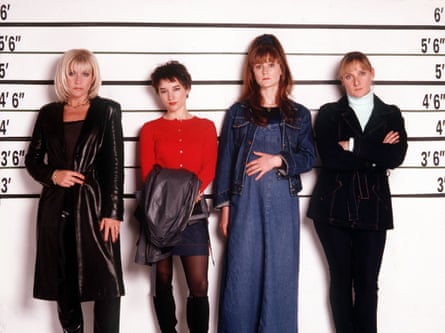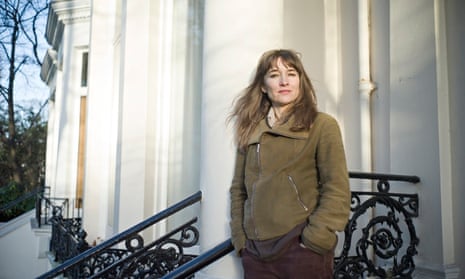Around halfway through writing her second novel The Lightning Tree, the actor, writer and former trapeze artist Emily Woof got stuck. “I’d always lived quite a physical life and it was a strain on my body to be sitting at a desk for so long, churning things up, really getting in deep with words,” she says.
Woof is small, wiry, and speaks so softly from her position coiled up on the seat of a chair in a flat in north London that I struggle to hear her voice when I play back the interview tape. Before her well-received fiction debut The Whole Wide Beauty, published five years ago, Woof wrote scripts that she performed herself, on stage, screen, radio and sometimes on a trapeze.
Her switch to prose followed the death of her father, Robert Woof, who was director of the Wordsworth Trust in the Lake District, and her first novel reworked parts of her life story and bereavement. “I think it was a way of continuing the conversation with my father, initially,” she says. “My father died and I just found myself writing in the third person, ‘He did this’, ‘She thought that’ – and I found it so liberating, especially after writing for film, which is what I’d been doing. You can let things flow, and it doesn’t have to be so concise and tight. I seemed almost to embody him, to feel him, and a character came out of that process.”
To start with, the second novel came just as naturally, combining similar elements – a heroine who gets lost in early adulthood; a love affair; a northern setting – in a different story. But this time Woof wanted more, and she began to feel constrained by the frame she was working in.
The Lightning Tree links its modern protagonist, Ursula, with her great-grandmother Annie. Both women have a moment of spiritual awakening, which in Annie’s case proves catastrophic, driving her away from her husband and child into the constricting arms of the Plymouth Brethren.
“How to integrate an experience like that into life is really what the book is about,” Woof says. “I knew it would be difficult to write about because we don’t have much language for it in our culture and it can easily be misunderstood as madness. Or it can be understood as an opening up, and it can be a trauma because it’s a loss of self and there’s a great feeling of pain and grief, which isn’t easy to digest. I think I probably have about 10 more books in me about this.”
But while Annie and Ursula were connected in her mind, when Woof found she couldn’t bring them together on the page she put the book aside for a year and a half. When she picked it up again a new voice took control; a voice that addresses the reader in a sit-up-and-take-notice, second-person “you” on the first page: “These pages are so dry, the flat of your reading device so cold! If I could jump out, strike you with the full weight of my arm, make your heart pound, tickle you, caress you, do anything in my power to make you feel it.”
The effect is startling, but Woof’s new narrator solved the riddle: “Something in me had just shifted and I went, ‘Fuck, I don’t want to write in such a good, straightforward way’ … this voice emerged that was much freer, more direct and anarchic. And it was the key. I was struggling with how to shift in time and this voice just had that freedom. She could move you here or there, she could do what she wanted, and if she was lively enough I thought she could carry it off.”
The result is a novel that takes wild leaps, ducking and diving and weaving together the moments and episodes Woof wants to write about, often in an intensely impressionistic way. Ursula is the daughter of CND activist Joyce, and grows up in 1970s and 1980s Newcastle, doing headstands on the sofa, hanging out with her sour‑tempered granny and falling in love with lefty brainbox Jerry, with whom she has a sexy teenage romance. He goes to Oxford, she goes to India, and things fall apart. From a monastery in the Himalayas, where she has begun meditating, she tries to explain: “Suddenly a few words came into my head, and they said, I don’t exist. And I just sat in the silence, and there were no more words, there was nothing, all of a sudden, it was mad, totally wild, mindblowing. I can’t explain it. It happened … the world shattered, the sky broke in two, and the hills filled with love.”
“I wanted to write about spiritual love, I wanted that to be the heart of the book,” explains Woof, who had a similar experience herself as a teenager and still meditates sometimes. “I wanted the narrator to be able to say, ‘Look at all this crazy romance going on! Come on, wake up! Who cares about that?’”
But the readers she trusted to give feedback on early drafts urged her to make more of the earthly love between Ursula and Jerry, and spirituality was relegated. The novel had several possible endings and the one she settled on was a compromise: “I had to allow the romance to have its place.”
Woof was born in Newcastle upon Tyne in 1967, and grew up in the city, where her father taught English at the university for 30 years, and in the Lakes. The youngest of four, she went to a comprehensive and took for granted a degree of freedom she says would be unthinkable today. She was close to her family but her parents were busy and she became self-conscious, partly a consequence of being richer and posher than her peers.
She describes her admission to read English at Oxford as “almost like a scam”. Studying for two A-levels plus general studies, which didn’t meet requirements at most places, she took the entrance exam and got the offer of a place. At university she shunned the poetry revered by her parents in favour of critical theory and medievalism (“I was full of quests”). She began acting, entering her own adaptation of Charlotte Perkins Gilman’s The Yellow Wallpaper in a competition and being invited to play Rosalind in As You Like It by a bunch of older students who introduced her to the work of Pina Bausch and German physical theatre. She later enrolled in circus school.
“There was no separation between text and body and it just sang for me, this way of working. I ended up in Edinburgh, then touring all over the world, doing these quite free-form shows in which I would play different characters and climb up ropes and do bits of trapeze work. I was interested in androgyny and ideas of perfection. My work was quite weird and kinetic and uncompromising really, looking back on it.”
More conventional roles followed, and in 1996 Woof was cast opposite Rufus Sewell in a film of Thomas Hardy’s The Woodlanders, about which she wrote a funny article that described how she prepared for the audition by watching a Michael Caine video about acting and was disarmingly frank about the lure of fame. In 1997’s hit comedy The Full Monty she played Mandy, the troublesome ex-wife whose demands for child support are the spur for former steelworker Gaz (Robert Carlyle) to form his strip act.

Woof still acts from time to time; her approach is “fairly naturalistic, not much technique, I just try to be as spontaneous as possible when the camera turns”. She met her husband Hamish McColl – who co‑wrote the screenplay for Paddington – when they were both working in theatre, and sometimes wishes she had gone to drama school. But she became aware of a sense of dislocation because the “pretty, thoughtful girls” she was asked to play did not fit with her sense of herself as an athletic artist more suited to “quite big, almost buffo characters”. A sequence in her new novel sees Ursula, working as an actor in her wilderness years, nearly naked on a beach and ignored by a director fixated on his male star. Asked for her favourite roles, Woof names Nancy in Oliver Twist and thief Paula in Daylight Robbery, both made for TV.
“I think how we calibrate different kinds of love in our lives is probably the question I am most intrigued by,” she says. Woof has two sons aged seven and 14 and both her novels feature women struggling to combine motherhood with a sexual and creative life. Some readers were angered when adulterous passion did not sweep all before it in her debut, and the new novel, too, resists a view of coupledom as the ultimate happy ending. “Maternal love is so central to me, it’s such a big purpose in my life,” Woof says. “There are so many shades in it and they are relatively unexplored in fiction. There’s nothing sealed or obvious about it.”
And it is fiction that has taken her back to the north of England – to her father’s dedication to the centre at Grasmere where Wordsworth lived, and to the hillside where Annie has her epiphany in the new novel. Woof’s mother Pamela, she says, is “the best writer of anyone, so limpid and lucid”. They climbed together Helvellyn when Emily was six.
Woof remains interested in the search for spiritual meaning: “There was no religion in my upbringing at all but I remember longing for stillness. As a girl I would often go and sit in a church but it wasn’t anything I could get hold of, it didn’t fulfil this need I had for a space in which you could experience reality on a different level or with the body rather than the mind.”
She is impatient with the kind of literary criticism that makes too much of a writer’s biography, but sees her own inner life as her most vital raw material: “It’s like diving, you go right under and drag stuff up. And sometimes when it bounces to the surface it’s wonderful, so exciting and effervescent, it just bubbles up. And sometimes it’s a kind of agony, like agghhh there it is.”

Comments (…)
Sign in or create your Guardian account to join the discussion